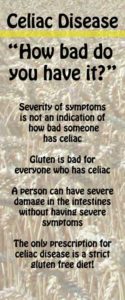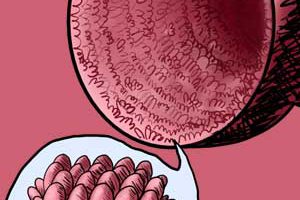So, how bad do you have it?

Often the friends woes and severity of what they go through is followed up with, “so, they have to be super careful”. Hmmmm! Everyone with celiac disease has to be careful! Cross-contamination hurts anyone who has celiac disease.
EVERYONE who has celiac has to be really careful of cross-contact and steering clear of gluten ingredients
Now, to go on telling me about your friend who has it really bad. . . I’m not sure what that is about. Is this a way to connect with me, that you know and understand celiac disease? Are you looking for sympathy for your friend? Are you trying to make me feel better, because I probably don’t have it as bad as someone you know?
I may be a little sensitive
Okay, so I may be a little sensitive on this one! You telling me about your friend, who has it really bad, makes me feel like you are assuming that I couldn’t possibly have it worse than your friend!
If you have read my health story you know it has been a long and hard journey for me! So many years being told my symptoms were stress related and if I would just settle down I wouldn’t break out in hives. Even now, having many medical professionals who will blow off that Urticarial was my major celiac disease symptom, because they believe that having hives related to celiac is rare!
It wasn’t all in my head!
I cannot put into words, accurately enough, to describe the pain and frustration I felt for soooooo many years, as I wanted to rip my skin off! I cannot tell you how many nights and days I have cried because here comes another wave of itchy, horrible bumps and not knowing how long this bout will last and worrying about all I needed to do. I can’t tell you how hard it was to function like a normal person while wanting to tear my skin from my body, trying not to itch and being medicated to try and control the itch.
Very few people even knew what I was going through, since most of the time the hives were hidden under my clothes.
My symptom has never been taken seriously.
I don’t have any pictures of my hives because I never imagined I would want to show them to anyone! I do wish I had some, especially when they would make my lips would swell like I had a really bad Botox injection. Or when hives would be on one of my eyelids. At the time, I was really embarrassed by what was happening to me.
More symptoms
After I was diagnosed and completely gluten free, I realized that there were so many other symptoms that had been brushed off as part of something else:
- Chronic sinus infections (I hardly ever have sinus problems, now)
- Frequent gas
- Smelly gas
- Brain fog (Seriously, it does feel like your brain is trying to think through a thick fog that just will NOT lift)
- Bloating (I didn’t understand what bloating was because I was always bloated! It was a normal feeling for me.)
- Headaches/migraines
Severity of Symptoms
Many people, even those who have diagnosed celiac disease, do NOT understand celiac disease symptoms.
- With more than 200 symptoms, everyone is different.
- Symptoms or even lack of symptoms does NOT indicate how “bad” you have celiac disease. You may have really severe symptoms while having very little intestinal damage and vice versa.
- The true indication of how celiac is affecting a person is done through a biopsy and “how bad it is”, is based on the damage in the small intestine.
- Symptoms or lack of symptoms are a poor indicator to how accidental gluten or cheating on a gluten free diet are affecting you.
- Symptoms as well as their severity can change over time.
- It doesn’t mean that your body isn’t being harmed if your symptoms aren’t severe.
I can eat a little, it doesn’t bother me
 This statement makes me cringe! I see people stating this on gluten free and celiac Facebook pages all the time!
This statement makes me cringe! I see people stating this on gluten free and celiac Facebook pages all the time!
It drives me crazy when I try to warn people about a product or risky gluten behaviors, and I have sources to back it up; someone will immediately follow the warnings with: “I eat it all the time and I have no problems from it.”
Another one that gets me is those who say they can eat Cheerios or any oats regardless of whether they are certified (or follow a purity protocol) to be gluten free. As well as those that encourage a little cheating, like they do, and how it does them no harm.
They like eating what they want and don’t want to hear or understand the harm they may be causing themselves and others.
Lack of symptoms and/or symptom severity isn’t an indication that you are doing fine and that risky behavior isn’t having an affect on you.
Not only are these people putting their villi and intestinal lining in danger by challenging it on a regular basis, but they are putting themselves at greater risk for the following:
- Whether you realize it or not, every time you eat gluten a reaction is triggered.
- Intestinal damage
- (early) osteoperosis
- raising the risk of certain cancers (Non-Hodgkins Lymphoma, just to name one)
- Increasing risk of associated diseases and conditions
- Increased risk of death-from complications due to celiac disease
- harming others
Symptoms can change over time
 Just because you may have had some really severe symptoms when you were diagnosed, doesn’t mean it is going to be that way every time you get gluten.
Just because you may have had some really severe symptoms when you were diagnosed, doesn’t mean it is going to be that way every time you get gluten.
Once your body isn’t being saturated with gluten, it isn’t sending out huge warning lights saying “there’s a problem here!!!!”
After being gluten free, the body often reacts differently, sending the message: “Whoa! This is not good! Be more careful with your diet!” Your body is crying, “Be nice to me! Why are you putting me through the again?!” Likely, the messages from your body will get louder and stronger, if you are lucky. Otherwise, the first indication that this hasn’t been good for you could be cancer.
Remember my chronic hives? I was worried that any cross contamination would bring on a wave of hives. That’s not what has happened, not even close! I haven’t had a single hive since going gluten free even though it took time and accidents happen, especially when eating out.
My symptoms now range from hardly noticeable to really sick.
- severe/migraine headache
- sudden sinus issues
- feeling off
- irritable (mild to severely)
- bowel issues
- flu like feelings without having any type of flu
- symptoms go on for 3-5 days
Lack of symptoms doesn’t mean you are now okay with gluten
Celiac disease is a lifetime disease. You have no way of knowing when it is actively harming your intestines. Once you are diagnosed with celiac, it is imperative that you follow a strict gluten free diet for the rest of your life. This is your prescription to long term health! You decide how healthy you are going to be, by choosing to strictly to comply with the gf diet. In a lot of ways, your health is in your hands!
The best part about the gluten free diet being the prescription to better health, if you have celiac, is there are NO side effects like you get with pharmaceuticals!
So, while your friend may have really severe symptoms, that doesn’t mean they have celiac disease worse than anyone else. Symptoms do NOT tell you how much damage has been done or is being done, by eating gluten.
EVERYONE who has celiac disease has it really bad!
Please share








3 Comments
Leave your reply.